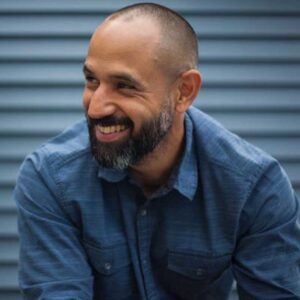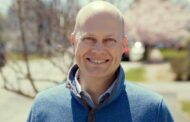
Roberto Rodriguez on LD2003: To have change, we need to push against the norms.
Every month PelotonLabs co-founder Liz Trice interviews a local community member. This month, Liz caught up with Portland City Councilor Roberto Rodriguez.
At the December 18th city council meeting you led a series of amendments to implement LD2003. This state bill would allow four units on almost any house lot. That was a big accomplishment.

LD2003 was a Maine legislative bill to address the housing crisis by allowing up to four units on each house lot. Each municipality had to update their ordinances by January 1st, 2024. And in Portland, the council took it up on December 18th, the last meeting of the year before the deadline.
After the bill was passed in 2022, the planning department process that included public meetings came up with their proposal for compliance with several provisions that would prevent four units from being created in a number of situations. The Urbanist Coalition of Portland – UCP – had been active throughout the process and reached out to the council to get us to remove those provisions.
I was really interested in fully implementing LD2003 and in making it easy for homeowners to be able to add units to their homes and lots. And in doing so help to improve the housing crisis. I forwarded the proposed amendments to corporation council (the city’s lawyer) on December 1st, so planning staff could give feedback. The Friday before the meeting I heard that the planning staff was concerned that the amendments make substantial changes to the recommendation and should maybe be sent back to the planning board.
Then what happened at the December 18th meeting?
At the December 18th meeting, it became clear that the Council does, in fact, have the right to make direct amendments like we did. But the city’s attorney still suggested that maybe it go back to the planning board for additional review. The council felt that we all understood what was being proposed and that the planning board had already considered the matter. So there was no need to send it back. At the city council meeting, all of the amendments were passed, which removed all the barriers to LD2003 being fully implemented.
One of the things that helped me the most as sponsor of the amendment was how much constituency groups worked to inform the council. So the council felt really comfortable with the change. The Urbanist Coalition was really helpful.
What’s the bigger picture of how you envision Portland growing in a positive way?
Housing is mostly about supply and demand. The more units we build overall, the more likely the market will settle down and not be so expensive. We need new homes to be closer to where people work and closer to transit. If people are living far from Portland and need to commute, it stresses the individual in terms of their time and budget, but also stresses neighborhoods because of increased traffic. Long-term we want to support more transit, autonomous cars, and other technologies that reduce traffic and auto dependency. And density in and near Portland supports that. It’s a big deal whether you have to commute to Portland from ten miles away or thirty miles away.
As a result of LD2003, hopefully a homeowner might add an extra ADU. Or make an old single-family house into a 2- or 3-unit, and have a rental unit in their home. I don’t think it’s likely we’ll see a huge wave of change, like aggressive teardowns. My impression is that building four units per lot in most of our neighborhoods is not appealing to developers in the current market.
LD2003 was a big accomplishment. What else do you think you might be able to accomplish in the coming year or so?
I’m still on the Housing and Economic Development Committee, but I left the Sustainability Committee and joined Health and Human Services so I could focus on encampment issues. I also just got on the board of Metro.
We’ve talked a lot about revisiting the Short Term Rental (STR) policy. If we added 400 units through LD2003 over the next few years, we could consider that a significant accomplishment. But there are already 400 units out there as STRs that could be available. One possibility is to limit the number of years that an individual could have a license. We can also look at other municipalities to see how they have evolved on the issue over the last few years.
We’d like to make progress on the Franklin Street proposal this year. Originally the focus was transportation, but now we’re seeing it as an opportunity to build housing because so much new land would be freed up.
How do you think effective change happens?
To have change, we need to push against the norms and work on issues that may not seem acute but will make a big difference in the future. I think of City government as three parts working together: Staff who are technical experts of everyday city functions. Then you have the manager that’s looking at the big picture of the organization, and the council is like an entrepreneur bringing forward new ideas. When lots of constituents get involved, you have the potential for really creative thinking and ideas. I wish I knew a way to foster more of that. To make change, all three of those parts need to be open to hearing different perspectives and trying different approaches.
The more people are comfortable with the content and the processes of government, the more we can think out of the box and be more aggressive in solving the city’s housing problems. It can be easy to take a moral stance on things, but typically it’s not just good or bad. It’s just complicated, and people have different perspectives. Our shared goals are to meet the needs of the city’s residents, and I believe we should be able to meet everyone’s needs.
For someone who is passionate about an issue, how can they make a difference?
This is the perfect city for that. It’s a thriving city but still small enough to make a difference. It helps me to contextualize the size of our city thinking of going to Miami Dolphin’s games back home in a stadium that seats 65,000 people – the same as the population of Portland. So I have seen that many people in one place with one focus, and it’s an amazing energy. Getting involved in something close to you – in your neighborhood or on your street – is the most rewarding thing in the world. And it’s so exciting. You will make a difference.
More information:
Contact Roberto at: (207) 450-9729, rrodriguez@portlandmaine.gov
[Disclosure, Liz is active volunteer with the Urbanist Coalition]





